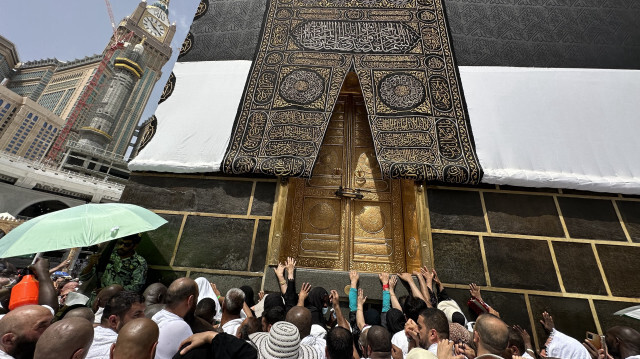Eid al-Adha: What is the ‘Feast of Sacrifice’?

The second major festival of the Islamic calendar honors the spirit of sacrifice and sharing
Eid al-Adha, or the “Feast of Sacrifice,” is right around the corner and Muslims around the globe are preparing for one of Islam’s most significant festivals.
It is the second major festival for Muslims after Eid al-Fitr, which is celebrated at the end of Ramadan, the holy month of fasting.
It takes place between the 10th and 13th day of the Islamic month of Dhul Hijjah, as Hajj – the sacred pilgrimage that is the fifth and final pillar of Islam – finishes in Saudi Arabia.
Dhul Hijjah, the 12th and last month of the Muslim lunar calendar, is itself considered one of the holiest in the Islamic year and Muslims often fast on its first nine days.
Eid al-Adha celebrations begin in most countries this year on Wednesday, and a day later in some places such as Pakistan and India.
- Origins of Eid al-Adha
Islamic narrative has it that Prophet Ibrahim, or Abraham, the forefather of the monotheistic religions of Islam, Christianity and Judaism, received through his dreams a commandment from God to sacrifice his son Ismail, or Ishmael.
Ibrahim and Ismail submitted to the will of God and were ready for the sacrifice as an act of faith and obedience.
The devil – known as “Iblis” in Islam – tried to dissuade Ibrahim from following the order and the prophet threw stones at him to chase him away.
This act is commemorated by Muslims as a rite of Hajj, where they cast pebbles at symbolic pillars in the city of Mina.
Seeing Ibrahim and Ismail’s obedience, God sent down a lamb from the heavens for the sacrifice, according to Islamic tradition.
A similar version of the story is also mentioned in Christianity and Judaism.
Muslims around the world celebrate Eid al-Adha to honor the devotion of Ibrahim and Ismail.
The symbolic sacrifice of livestock is part of the rituals associated with the festival, but is not an obligation in Islam, rather an act that is encouraged.
- Significance of Eid al-Adha
Eid al-Adha, known as Kurban Bayrami in Turkish, has historically been a festival of giving.
There is heavy emphasis on charity in Islam, with Zakat, the Muslim practice of almsgiving, being one of the religion’s five pillars.
Eid al-Adha gives Muslims another opportunity for charity.
The meat from any sacrificed animal is shared with the poor, along with family members and friends.
Individuals can sacrifice a sheep, goat or lamb on their own, while a cow or camel can be shared by seven people.
There are also strict rules when it comes to the animals, as it is forbidden to sacrifice sick, disabled or wounded animals.
Islam also requires that the slaughter be minimally painful for the animal.
Many Muslims also opt to pay the value of an animal to charities that distribute meat to people around the world, particularly in areas known to be in greater need.
- Connection with Hajj
Eid al-Adha and Hajj are also deeply intertwined.
The millions of Muslims performing the pilgrimage sacrifice an animal on the third day of Hajj.
After the sacrifice, they have their hair trimmed or head shaved and change out of the pilgrim’s “ihram,” the clothes worn specifically for Hajj to symbolize a state of purity and renunciation of materialism, and to nullify differences of wealth and status.
Over the following days, they perform the “tawaf,” when pilgrims circle the Kaaba, which Muslims consider the house of God built by Prophet Ibrahim and Ismail.
They also redo the ritual known as “sai,” walking or running seven times between the Safa and Marwa hills, before going back to stone the three pillars that represent the devil.
Finally, they do a farewell tawaf to complete their Hajj before leaving Mecca for their homelands.
Reklam yükleniyor...
Reklam yükleniyor...







Comments you share on our site are a valuable resource for other users. Please be respectful of different opinions and other users. Avoid using rude, aggressive, derogatory, or discriminatory language.